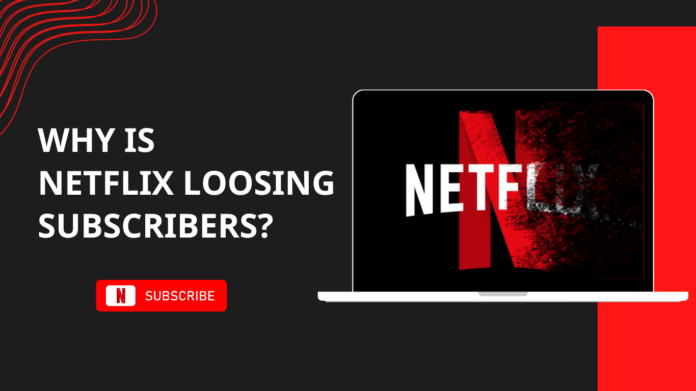The success of Netflix seemed to know no bounds for a long time. However, in recent years the company appears to have reached its peak and is now facing a downward slope. Allow me to explain.
Netflix Pulled Its Service from Russia
Following the outbreak of the Ukrainian war, Netflix joined hundreds of other companies in isolating Moscow. Their act of protest was the suspension of streaming services in Russia.
Even though this choice appeased the public, losing 700 000 subscribers did not please investors. Unfortunately, this was not the only loss the war brought upon Netflix.
In the aftermath of Russia’s invasion, the global economy was weakened; global trade was disrupted and the price of fuel and food increased significantly. As a result citizens were forced to cut discretionary expenses.
Pandemic initial success
The pandemic that hit the world in 2019 has forced many companies to close their doors. Netflix however, is one of the few companies in which the COVID restrictions were not detrimental, but rather beneficial.
During the outbreak, citizens had to remain indoors to avoid contracting the virus and to distract themselves from the devastating effects of the disease.
Consequently, Netflix’s global subscriber count increased to more than 26 million in the first half of 2020. By the time vaccines were available, people took more precautions against the virus, resulting in fewer infections worldwide each day.
The majority of people weren’t interested in watching House of Cards from morning till noon anymore and those who were couldn’t. Life started again for students and working-class people. Gone were the days of waking up at 1 pm and lounging the entire day, back was the 9 to 5 routine.
Netflix Hiked Up Prices in US and Canada
Netflix increased its subscription price in the United States and Canada at the beginning of 2022. The price hike caused an uproar, with many cancelling their accounts. Netflix was reported to have lost a shocking 600 000 subscribers.
Account sharing slows down the growth of Netflix
Account sharing has been one of Netflix’s most significant challenges over the years. Netflix passwords are frequently shared, even though it is specifically prohibited in the Terms of Service.
The company estimates that 100 million households, including 30 million in the USA and Canada, use the service without paying a subscription fee.
The quality of original content
In recent years, multiple media companies, such as HBO Max and Discovery+, have merged and launched streaming services, pushing content through them, rather than licensing through Netflix.
Netflix was then left with no other choice than to invest in producing original content. Although there are some notable hits like The Witcher, unfortunately, there is not enough stellar content to make up for other original projects that are somewhat mediocre.
Too much content and yet so little that is worthwhile
The sheer quantity of content available is imitating. According to Business Insider, South Africa’s Netflix library contains more than 5,400 films and series.
Compared with Denmark and Switzerland, South Africans pay almost half as much for subscriptions. However, the quality of the content we receive is not up to par.
The content on Netflix South Africa ranks 6.73 out of ten on IMDb, the largest online movie reviews and rating database.
The abundance of streaming services
In today’s market, streaming services are abundant. Aside from Netflix, Hulu, HBO, and Amazon Prime Video, there are other streaming services such as Paramount+, Disney+, Apple TV+, ESPN+ and so forth.
As individuals cannot possibly subscribe to all of them, they make their selection based on their budget and the availability of content.
Algorithm
One would think that Netflix’s algorithm system should be faultless, given that the company is the biggest streaming service in the world. However, consumers would argue that while it is still functioning perfectly, it is broken. Let me explain.
The algorithm takes into account a user’s consumption history, their watch time, and even the time of day they prefer to consume content, to predict whether a consumer will enjoy a particular title. Users’ inaction, however, is not taken into account.
As a source of user feedback, Netflix uses the thumbs-up rating system for optimizing its recommendation algorithms. Netflix neglects to consider that when users log into its site, they want to relax, rather than manually optimise their suggestions list.
This leads to users not giving a thumbs down to titles they have no interest in watching. As a result, users miss out on content they might love as it becomes buried beneath unwanted or previously watched suggestions.
Secondly, there is a deeper and more fundamental flaw. Correlation is the only metric Netflix can measure, not causation. As an example, the algorithm can identify that I enjoy both Peaky Blinders and Breaking Bad, however, it cannot pinpoint shared qualities that appeal to me.
Lack of a rating system
Rating systems are essential, regardless of what products or services are offered. A consumer wants to make an informed decision when choosing a movie or series to watch. Fantastic Beasts, the Crimes of Grindelwald, for example, might seem like an excellent film, yet it scored a shocking 36% on Rotten Tomatoes.
Too many shows get cancelled too easily
In 2020, Netflix cancelled several shows, such as Altered Carbon, I Am Not Ok With This, The Dark Crystal: Age of Resistance, V Wars, Messiah, and many others. It is worth noting, however, that since Netflix has more original series than any other studio, there are bound to be more cancellations.
Nonetheless, Netflix doesn’t seem to be willing to give shows a chance to grow. The number of content published each month without any marketing is staggering.
Netflix still stands as the biggest streaming service, however, the question to ask, is for how long? The company’s subscriber count and stock are falling.
Is it only a matter of time before the billion-dollar conglomerate alienates its consumers, driving investors away, or will it rise to its former glory?


